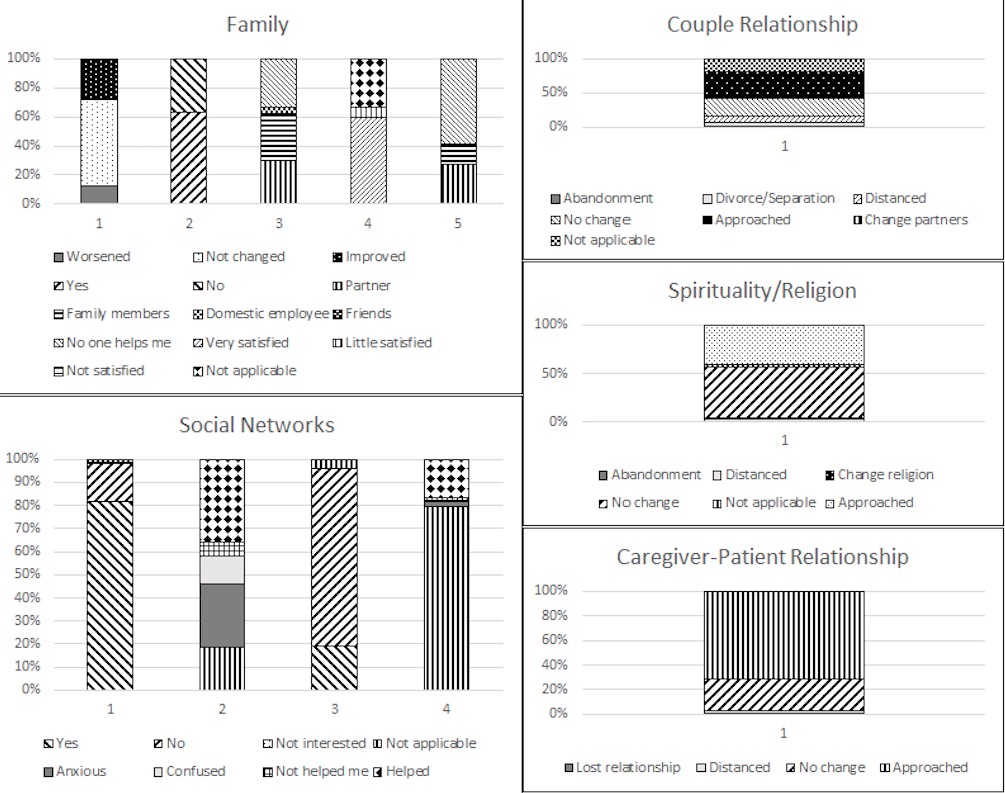Session Information
Date: Sunday, November 8, 2020
Title: Pediatric Rheumatology – Clinical Poster II: Systemic JIA, Autoinflammatory, & Scleroderma
Session Type: Poster Session C
Session Time: 9:00AM-11:00AM
Background/Purpose: Pediatric rheumatic diseases (PRD) are a heterogeneous group of disorders. PRD patients and their caregivers face a number of challenges, these include the consequences of the PRD in patients and the impact on multiple dimensions of the caregiver’s daily life. Our group developed and validated the CAREGIVERS questionnaire to measure the impact on caregivers of children with PRD.
The objective of this study was to measure the economic, psychological and social impact that PRD has on the caregivers of Mexican children and the factors associated with these impacts.
Methods: This is a cross-sectional study in which primary caregivers were prospectively included between April and November 2019 in four public hospitals of specialized care. Descriptive statistics used used to the sociodemographic characteristics of the participants and the patients’ clinics, a univariate analysis was performed with the interview responses of the CAREGIVERS questionnaire and the sociodemographic, clinical, and health system variables using the Chi square, Mann-Whitney U, and Kruskal-Wallis tests (p < 0.05).
Results: 200 participants were included, women (84.5%) with median age of 38 years; 54.5% cared for patients with JIA, 14% with JDM and 31.5% with JSLE. Most of the caregivers felt concern (42.5%) when learning about the diagnosis, which then was modified by tranquility (44%) when the current feeling was questioned; however, 40 expressed sadness when sharing the patient’s PRD (20%) and 39 do not like to do so (19.5%).The main cause of concern is pain (41.5%), followed by difficulty in movement (28.5%) and covering the costs of treatment (25%). Social impact: In 99 caregivers (49.5%), the use of their time changed a lot upon learning the PRD. Social life varied according to the PRD, in JSLE it had a significant change (39.6%), but it did not change in JIA (44%) and it slightly changed in JDM (53.5%, p < 0.01).Financial impact: the family financial situation worsened upon diagnosis of the patient in most cases (JIA 63 [57.8%], JSLE 19 [69.8%] and JDM 44 [67.8%], p = 0.27). Almost two thirds had had to borrow money, more frequently in JSLE (48 [76.1%] vs JIA 62 [56.8%] and JDM 19 [67.8%], p = 0.03); 63 stopped buying medicines due to lack of money (31.5%) and 86 received additional financial support for the treatment (43%).The emotional impact increased in caregivers of male patients. Social dimension showed significant differences regarding PRD, healthcare system, time to reach the center, presence of disability, active disease, cutaneous and systemic manifestations and treatment.
Conclusion: This study highlights a series of lessons learned and the most important is the need to improve opportunities for support, especially regarding financial support, for caregivers of patients with PRD. The study has shown that social status can be devastating in the impact that PRD can have on families. We feel confident that, although all the participants are Mexican, the findings can be generalized to populations with similar characteristics in other regions
 Fig.1 Socio-economic impact in caregivers
Fig.1 Socio-economic impact in caregivers
To cite this abstract in AMA style:
García Rodríguez F, Fortuna B, Pelaez-Ballestas I, Faugier Fuentes E, Mendieta Zerón S, Reyes Cordero G, Jiménez Hernández S, Villarreal Treviño A, Guadarrama J, Rosiles de la Garza S, de la O Cavazos M, Rubio Pérez N. Rheumatic Diseases in Mexican Children and Their Psychosocial and Economic Impact on Caregivers [abstract]. Arthritis Rheumatol. 2020; 72 (suppl 10). https://acrabstracts.org/abstract/rheumatic-diseases-in-mexican-children-and-their-psychosocial-and-economic-impact-on-caregivers/. Accessed .« Back to ACR Convergence 2020
ACR Meeting Abstracts - https://acrabstracts.org/abstract/rheumatic-diseases-in-mexican-children-and-their-psychosocial-and-economic-impact-on-caregivers/
